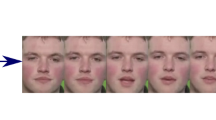Introduction
Performer-driven animation has been used with success 1, first of all to reproduce human body motion. While there are different capturing hardware-software systems to map the motion of a performer on the motion of a model of the body or face, little has been done both on the technical and on the theoretical level to support the inventive re-use of captured data.
Preview
Unable to display preview. Download preview PDF.
Similar content being viewed by others
References
L. Williams, “Performance-driven facial animation,” in Computer Graphics (SIGGRAPH’ 90 Proceedings) (F. Baskett, ed.), vol. 24, pp. 235–242, aug 1990.
I. Essa, S. Basu, T. Darrel, and A. Pentlands, “Modeling, tracking and interactive animation of faces and heads using input from video,” in Proceedings of Computer Animation’ 96, pp. 68–79, 1996.
ISO/IEC 14496-2, “Coding of audio-visual objects: Visual,” tech. rep., International Organisation for Standardisation, Tokyo, March 1998.
FASE home page: http://www-it.et.tudelft.nl/FASE.
Z. Ruttkay, P. ten Hagen, and H. Noot, “Constrained-based keyframing,” in Proceedings of the ECAI’ 98 workshop on Constraint technologies for artistic applications, ECAI, August 1998.
Author information
Authors and Affiliations
Editor information
Editors and Affiliations
Rights and permissions
Copyright information
© 1998 Springer-Verlag Berlin Heidelberg1998
About this paper
Cite this paper
Ruttkay, Z., ten Hagen, P., Noot, H., Savenije, M. (1998). Facial Animation by Synthesis of Captured and Artificial Data. In: Magnenat-Thalmann, N., Thalmann, D. (eds) Modelling and Motion Capture Techniques for Virtual Environments. CAPTECH 1998. Lecture Notes in Computer Science(), vol 1537. Springer, Berlin, Heidelberg. https://doi.org/10.1007/3-540-49384-0_21
Download citation
DOI: https://doi.org/10.1007/3-540-49384-0_21
Published:
Publisher Name: Springer, Berlin, Heidelberg
Print ISBN: 978-3-540-65353-0
Online ISBN: 978-3-540-49384-6
eBook Packages: Springer Book Archive




